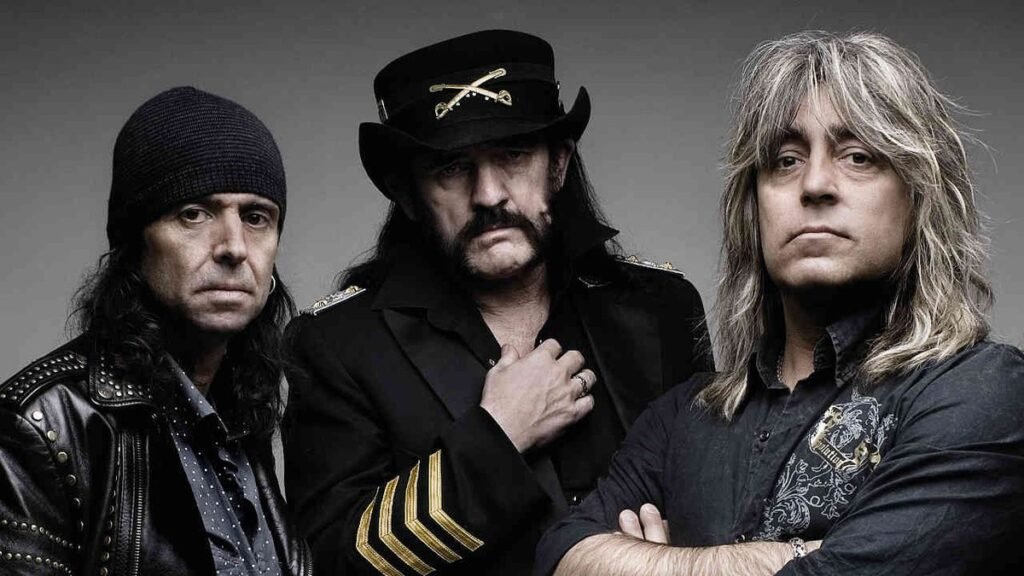The intelligence of Lemmy Kilmister hasn’t ever been unsure, however the nice guy will be the first to confess that rock’n’roll and rocket science are evidently no longer the similar factor. Some choices within the existence of a pro musician are as easy and intuitive as can also be.
By the point Motörhead arrived within the 90s, it was once obvious that Phil Campbell was once an indispensable a part of the band’s sonic tapestry and that Würzel in point of fact wasn’t. More and more indifferent from the ingenious procedure, Würzel left Motörhead by means of one thing drawing near mutual consent, making the rest trio’s choice to proceed with out bothering to interchange him significantly more straightforward. Let’s face it, the ‘vintage’ Motörhead line-up was once a three-piece, and when your song hinges on simplicity, brutality and unpretentious vigour, a six‑legged sonic assault is greater than good enough.
Motörhead had been now a trio for excellent: simply, you watched, as nature supposed all alongside. Lemmy, Phil Campbell and Mikkey Dee. They had been Motörhead they usually performed rock’n’roll. Easy.
Recorded with revered studio guru Howard Benson on the controls for the 3rd time, 1996’s In a single day Sensation was once no more or less radical departure and briskly maintained Motörhead’s momentum in laudably seamless style. It presented not anything in the best way of jaw-dropping surprises and easily picked up the place Sacrifice left off. Exemplified by means of rampaging opener Civil Struggle and the acerbic fee of the identify monitor, In a single day Sensation was once a somewhat heavier affair than its predecessor, however Würzel’s absence was once a footnote reasonably than a speaking level.

Essentially the most vital exchange in Motörhead’s global for this album was once a newly minted association with US file label CMC. That apart, this was once trade as standard: as loud, proud and obnoxious as ever, albeit with the added bonus of Lemmy’s harmonica talents at the distinctly lascivious Loopy Like A Fox.
Motörhead hit the street in improve of In a single day Sensation early in 1997. All through the summer season, alternatively, the band skilled issues on a co-headlining US jaunt along Blackie Lawless and W.A.S.P. Appearing prior to the sleaze rockers as an issue of comfort, in large part because of the truth that they, as Lemmy later defined, “couldn’t get the hen feathers and fucking blood wiped clean up fast sufficient”, Motörhead grew hastily drained in their traveling companions’ tendency to behave as though they had been the true headliners. As Phil Campbell stated: “If there was once a listing of ten belongings you wouldn’t to find in a Motörhead dressing room, Blackie Lawless can be on the most sensible! Ha ha! We fucking hate that cunt. He’s a garbage fats paratrooper and about as bad as Fozzie Undergo.”
Two years on from In a single day Sensation, Motörhead launched their 14th studio album in March 1998. In line with the band’s love for spontaneity, Snake Chew Love was once written and recorded inside of an issue of weeks, once more with Howard Benson on the table, and it reflected its predecessor’s hard-as-nails mix of heads-down belligerence and bulky turbo-blues.
Prepared observers will have spotted that Motörhead gave the look to be edging incrementally in opposition to extra metal-friendly territory at this level, no longer least at the thunderous Canines Of Struggle, however the album remained firmly in rock’n’roll territory for essentially the most section and peaked at the grinding riff-fest of Pleasure Of Labour, through which Lemmy posited the sinister question, ‘Do you wish to have to appear proper within the Satan’s face?’ The music conjured the similar sense of overpowering threat that first reared its horned head again on Orgasmatron in 1986.
Actually, Snake Chew Love did sound a little bit rushed and missing in substance, however listened to on the proper cranium-shattering quantity, it nonetheless had the specified and supposed impact. In its defence, Lemmy later said that the trio had been “at all times underneath the hammer. We’re very lazy in rehearsing. We by no means have anything else in a position! We fake to rehearse, then we move to the studio and we’re trapped on the console with the manufacturer evident and other folks having a look at their watches… however Snake Chew Love is without doubt one of the best possible albums we’ve made, I suppose. We don’t do filler.”
Amusingly, Motörhead controlled to have a none-too-subtle dig at Prince within the liner notes to Snake Chew Love, the place Phil Campbell’s title was once represented by means of an incomprehensible squiggle and the explanatory moniker of ‘The Artist Regularly Observed At The Liquor Retailer’. The scamps.
After the discharge in their 3rd are living album, The entirety Louder Than Everybody Else, within the spring of 1999, Motörhead would possibly smartly have sensed that the approaching new millennium presented them a possibility to rejuvenate and redefine their now right away recognisable squall of unreconstructed bedlam. Recorded in Germany and California right through two snappy studio periods, their first album of the twenty first century would turn out to be each probably the most best the band had produced thus far, and a tantalising taster of the sustained creative spurt that will be sure that the Kilmister/Campbell/Dee line-up would in the end be said as, on the very least, the equivalent of the line-up that made Ace Of Spades twenty years previous.
We Are Motörhead – an evident observation, in all probability, however one value restating endlessly – emerged within the spring of 2000, embellished with probably the most best and maximum grotesque items of art work that long-time collaborator Joe Petagno has ever created for the band. The contents of the album undoubtedly lived as much as its outward look, with songs like face-melting opener See Me Burning and the quick, sharp slap to the knackers of We Are Motörhead itself fizzing with renewed power.
There was once even room for a pulverising quilt of the Intercourse Pistols’ mythical God Save The Queen. “I at all times liked the music,” said Lemmy. “The Pistols had been an actual rock band. Steve Jones is certainly one of the most productive rhythm guitar avid gamers in rock’n’roll.”
Oddly, for such a longtime vintage, Motörhead’s model was once virtually universally smartly gained, no longer least since the band’s affinity with punk rock has at all times been integral to their sound. Lemmy twisted up the immortal line ‘There may be no long term in England’s dreaming’ like he supposed it, too – however then he does are living in Los Angeles, in the end.
To counteract the seething fury of We Are Motörhead’s extra vicious moments, the album additionally boasted probably the most bombastic ballads in the band’s canon, One Extra Fucking Time. That is a remarkably delicate affair that, in spite of its sweary identify, hints at a splash of vulnerability in Lemmy’s normally impregnable armour of proud humanity. ‘I will be able to plead no contest if loving you’s against the law,’ he proclaimed. ‘So move on and to find me accountable only one extra fucking time.’
As ever, 1999 and 2000 had been years ruled by means of on-the-road patience from the Motörhead camp. There have been excursions of Europe right through the spring of ’99, coinciding with that first recording consultation, after which throughout the United States within the autumn, with Nashville Pussy as major improve. This ended in a somewhat incongruous however extremely a success 2d Ecu excursion underneath the banner ‘Monsters Of The Millennium’, with Dio and Manowar finishing an impressive invoice.

In October, Motörhead celebrated their twenty fifth anniversary with a different display at London’s Brixton Academy. Visitor appearances from Rapid Eddie Clarke, Queen’s Brian Would possibly, Doro Pesch and a number of different buddies of the band helped to make the tournament a a success one.
Not like many different bands in their antique, alternatively, Motörhead have by no means been susceptible to exploit anniversaries too strenuously and in spite of recording the entire thing for posterity’s sake, the band returned to their standard traveling existence virtually straight away, hitting the marketing campaign path in each Western and Jap Europe as Christmas loomed.
In 2001, Motörhead would embark on certainly one of their maximum perverse adventures, teaming up with WWE wrestling superstar Paul ‘Triple H’ Levesque and changing into, in brief, the unofficial area band for the ones preposterous, latex-sporting, muscle-bound bellends cherished of square-eyed American youngsters (and their it appears unashamed oldsters). The band wrote a brand new music, The Sport, with Global Wrestling Leisure composer Jim Johnston and recorded it to be used as Triple H’s new theme music. They even carried out the music, a limping dud by means of their standard requirements, are living at Houston’s Reliant Astrodome right through a high-profile WrestleMania tournament, rather correctly on April Idiot’s Day.
“I don’t specifically like wrestling,” said Lemmy. “It’s a bit of evident for me, however on the identical time there’s some nice characters in it. It’s no longer in truth a game to any extent further. It’s a display, a circus. It’s so terrible… however a few of that soap-opera bullshit is in point of fact rather humorous. The blokes we met attached to it are overall gents.”
If that wasn’t a abnormal sufficient assembly of minds, Lemmy’s look in a 2001 TV industrial for Package Kats took, you may say, the biscuit.
Again in the true global of rock’n’roll, Lemmy and the lads hit the street all over again for a excursion of the United Kingdom and Eire in Would possibly 2001, buoyed by means of the realisation that once the rather turbulent instances of the 90s, when heavy song was once in a state of flux and ruled by means of faddish sub-genres like grunge and nu steel, the days had been indisputably a-changing and transferring in a extra really helpful course for such a longtime and respected band.
The resurgence of pastime in authentic, balls-to-the-wall heavy steel will have been of little pastime to Motörhead themselves, given Lemmy’s infamous insistence that his band had been by no means a steel band in any significant sense, however the emergence of a new technology of children who had been each fascinated about steel’s previous and newly in a position to delve into its historical past by means of the wonders of the web (albeit illicitly) supposed the band’s sixteenth studio album Hammered was once launched right into a considerably other global than the person who had greeted their previous few efforts.
On no account a flat-out vintage, Hammered did include a barnstorming epic in Stroll A Crooked Mile, the swaggering Mine All Mine (that includes Weapons N’ Roses’ Dizzy Reed on piano) and spoken-word denouement Serial Killer, which noticed Lemmy sign up for forces with Triple H once more, their voices intertwined on a macabre piece of black poetry. Manufacturer Thom Panunzio, famend for his paintings with Bruce Springsteen and Alice Cooper, obviously hired the ‘if it ain’t broke, don’t repair it’ means of sound copy. Hammered delivered the products with abrasive aplomb.
However as their reputation started to upward thrust anew, Motörhead grew to become to the products and services of LA-based manufacturer Cameron Webb. Having began his profession as an engineer, operating on hit albums by means of Limp Bizkit and Godsmack, Webb was once no longer the most obvious selection, however Lemmy took a shine to him – in all probability because of an introductory observation that he appreciated “to provide other folks freedom within the studio, however I’m nonetheless gonna bust your balls” – and it best took the recording of 2004’s Inferno to ascertain a long lasting and extremely fruitful dating for all involved.
“Something I discovered in point of fact temporarily as we were given into pre-production is that Motörhead don’t do anything else they don’t wish to do,” Webb has since admitted. “Principally, you more or less give them a course and feature to realize their accept as true with…”
Inferno would develop into essentially the most significantly acclaimed album that Motörhead had made in twenty years. It will also be the most productive album they have got ever made. Starting off with the piledriving Terminal Display, that includes a visitor solo from shred-master Steve Vai, the band’s seventeenth album was once a excursion de power of adrenalised rock’n’roll. And it closed with Whorehouse Blues, an entirely acoustic and knowingly self-referential blues quantity, through which Lemmy declared that ‘you recognize we ain’t too excellent lookin’, however we’re glad’ – a telling synopsis of the Motörhead philosophy if ever there was once one.

In 2005, Motörhead defied the chances by means of selecting up their first – and best – Grammy award, for Highest Steel Efficiency. Bizarrely, the award was once given for a canopy of Metallica’s Whiplash that was once recorded for a tribute album, Steel Assault: The Final Tribute. The irony of receiving this kind of prestigious acknowledgement from the song trade, just about 30 years into the band’s lifestyles, for a music they didn’t even write, is not going to were misplaced on Lemmy, Phil or Mikkey.
An ideal fulfillment, nevertheless, the award was once some other great addition and when Motörhead launched Kiss Of Loss of life in 2006, their momentum endured apace. Roughly a repeat of the system that had made Inferno this kind of bolt from the blue, the Kiss Of Loss of life subject matter once more confirmed how finely honed the band’s songwriting equipment had been at this level.
Their partnership with Cameron Webb was once now company and bold, and 2008’s Motörizer once more hammered house the efficacy of the collaboration, maximum significantly at the two-minute ambush of Rock Out (‘…along with your cock out!’ in fact!) and anti-war anthem The Thousand Names Of God.
2010 would turn out to be an overly vital yr for Motörhead. Originally, Lemmy in the end gained the honour he deserved when administrators Greg Olliver and Wes Orshoski unveiled their lovingly crafted rockumentary Lemmy. A revealing find out about of the person, fable and legend himself, the movie featured impassioned testimonials from Slash, Duff McKagan, Nikki Sixx, Dave Grohl, Ozzy Osbourne and Metallica. The movie was once ridiculously humorous, and was once as fair and self-effacing as its superstar.
Secondly, because the yr drew to a detailed, Motörhead would free up their twentieth studio album, The Wörld Is Yours. And from the savage, nuts-out I Know How To Die via to the crushing, gradual‑movement grind of Brotherhood Of Guy, the album proved that 35 years on from their formation, the band had been nonetheless firing on all cylinders.
Most significantly, alternatively, the case for Lemmy, Phil Campbell and Mikkey Dee as the final Motörhead line-up have been greater than made and irrespective of any person’s nostalgic affection for the times of Bomber and Ace Of Spades, the ones 3 males constantly and jointly embodied their band’s maximum admirable attributes for over twenty years, and produced one of the vital loudest, smartest and dirtiest song ever recorded alongside the best way.
At the beginning printed in Vintage Rock Items Motörhead


